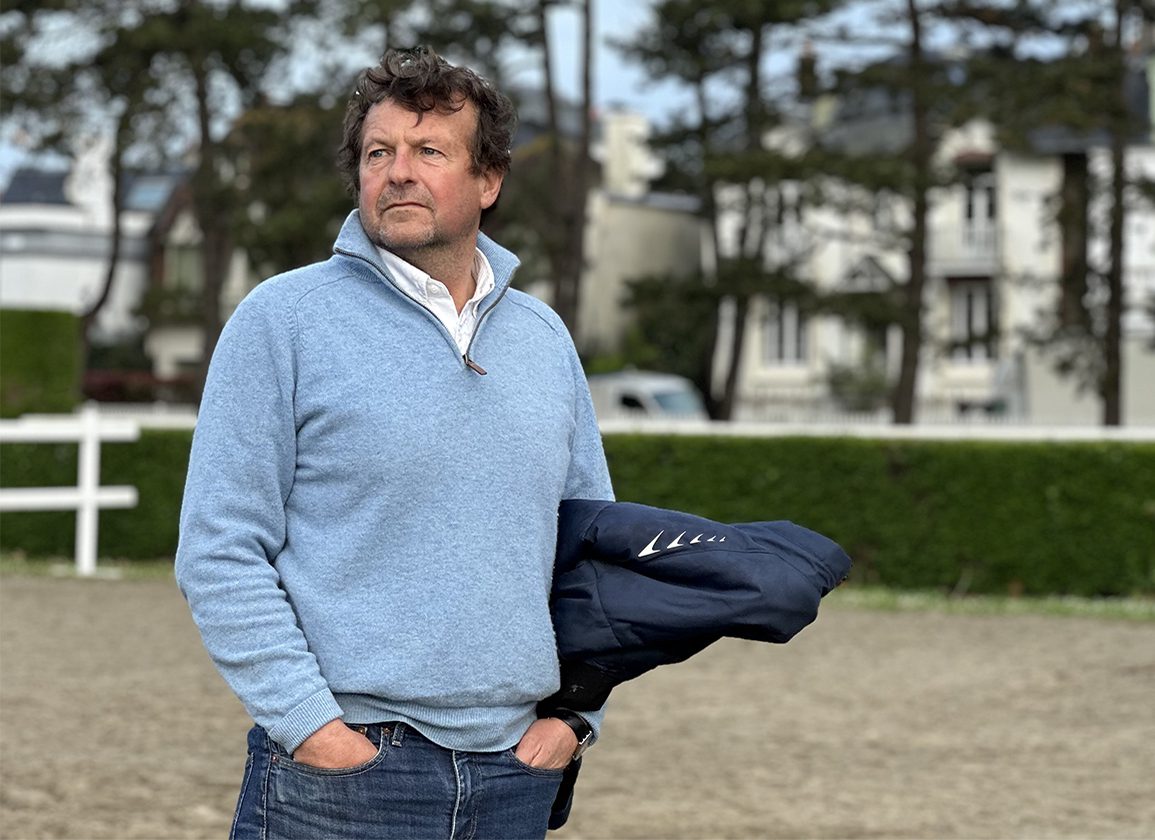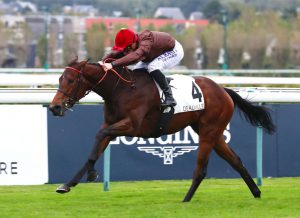For some, Deauville is a summer playground. Horse sales, racing, good food and a spot of shopping. We have the Duc de Morny to thank for that. Having been instrumental in the construction of the racecourse at Longchamp in 1857, Napoleon's half-brother turned his attention to the Normandy seaside and by August 1864, racing was underway at Hippodrome la Touques in the town which has continued to draw the rich and famous, both for horse racing and film festivals.
Nowadays, Deauville is no longer home solely to the August meeting. With an all-weather track and floodlights in addition to the turf, there is also racing in the town in spring, autumn and winter. Since the early 1980s there has also been a training centre alongside the racecourse, which benefits from the proximity of the beach for a variety in the horses' exercise routines.
Managed, like Chantilly and Maisons-Laffitte, by France Galop, Deauville's training centre is currently home to 13 trainers, including Stephane Wattel, who made the town his home 30 years ago.
As he approaches his 60th birthday, the affable Wattel jokes that his daughter Anastasia, who trains separately to him but also in Deauville, drops regular hints that he should be considering retirement. But Wattel Sr is currently in his pomp. He trained his first Group 1 winner last year after several of his horses have come close to that important metric in the past, and his stable of around 80 horses boasts an increasingly international mix of owners.
“Things have changed a lot,” admits Wattel as he reflects on his three decades of training in Deauville, where the reigning champion trainer Jean-Claude Rouget now has a major satellite operation to complement his original base in Pau.
“But I did find from the beginning it was a nice place to train, because it was a relaxing place for horses. It was not far away from all the stud farms around and it was not so far away from Paris.”
Stud farms loomed large in the early education of Wattel, whose family had no prior involvement in racing but who found himself working at the Niarchos family's Spring Oak Farm (now Oak Tree Farm) in Kentucky at the age of 18 after deciding that his university course wasn't for him. He would later work at Haras de Fresnay-Le-Buffard and at Beech House Stud in Newmarket, which has recently returned to being a stallion stud since Shadwell relocated Baaeed (GB) and Mohaather (GB) from Nunnery Stud and added Mostahdaf (Ire) to the line-up.
“When I started I had only three horses,” he continues, “I had no owners really behind me, just one, and it would have been impossible for me to start at Chantilly. I would have been totally lost.
“In this training centre there was Nicolas Madamet. He was the first trainer to have the idea of training all year in Deauville. It used to be a place to train during the summer for the meeting, so people from Chantilly and other places would come, but the track was good for training and suddenly one trainer had the idea that it was possible to train all year round.
“I was assistant trainer to Nicolas Madamet and after that I moved up to Chantilly for three years to work with Alain de Royer Dupré and for the Aga Khan. When it was time for me to start my career I thought that Deauville would be a nice place to start.”
Wattel also recalls that it was more than just the sea air that made it advantageous to train in Deauville when he was first starting out.
“Now it seems unbelievable to think that in certain races – when we were going to race in maidens in Paris – we used to have three pounds less for our horses because we were training in the provinces,” he says. “It's difficult to imagine that now. Can you imagine Jean-Claude Rouget's horses having three pounds less because he's training in the provinces? But that was the case, and a lot of races in the provinces were closed to horses trained in Chantilly.”
The treble Group winner Boris De Deauville (Ire) (Soviet Star) was one of the earliest stars for the Wattel stable, while City Light (Fr) (Siyouni {Fr}) came close to landing his trainer a major international victory when beaten a short-head by Merchant Navy (Au) in the G1 Diamond Jubilee S. at Royal Ascot. Now at Haras d'Etreham, City Light has made a positive impression with his early runners and was France's leading first-season sire in 2023.
Haras de la Perelle's Rosacea (Ire) (Soldier Hollow {Ger}) was third in the G1 Prix de Diane two seasons ago and her full-sister, Rimja (Fr), is now pleasing Wattel after the odd niggle kept her off the track at two. Jurgen Winter, owner of Haras de la Perelle, is one of the owner-breeders who has long supported Wattel and has the largest number of horses in the stable along with Baron Edouard de Rothschild of the nearby Haras de Meautry.
The partnership with Winter was rewarded when the Perelle homebred Simca Mille (Ire) (Tamayuz {GB}) became the trainer's first top-level winner last year in the Grosser Preis von Berlin.
“Having my first Group 1 winner with Simca Mille for Haras de la Perelle meant a lot for me,” he says. “And it was a very nice story from the beginning to the end of his career here in France.”
After Simca Mille failed to sell at €68,000 at the yearling sales, Wattel agreed to take him on and the horse raced initially in his own colours before Winter renewed his interest in the colt. A prolific performer, Simca Mille won three Group 2 races and a Group 3 as well as finishing runner-up in the G1 Grand Prix de Paris and G1 Prix Ganay. Towards the end of last year he was bought by Wathnan Racing and over the winter he has been trained in Qatar by French ex-pat Alban de Mieulle.
For almost every trainer there is a pressure to trade good horses, and for Wattel that now means a time of rebuilding, though his stable does include at least one Classic prospect in the G3 Prix des Reservoirs winner Tulipa Chope (Fr) (Born To Sea {Ire}), who is entered for Sunday's G3 Prix de la Grotte at Longchamp.
“It's a little more difficult this year,” he notes. “We sold a couple of good horses, like Simca Mille, [Group 3 winner] Immensitude and [Listed winner] Autumn Starlight. But at the moment we've got Tulipa Chope, who proved her quality last year, and she worked very well [last week] to prepare for the Prix de la Grotte. She seems to be very well and has had a good winter.”
Wattel adds, “Having City Light start his stallion career so well is a big pleasure for all the stable. We had the horse for a long time; it was not only a short career at two and three, but we kept him for a long time and we're thrilled that he's having a lot of winners.”
He also points out that, despite the precocity shown by some of City Light's offspring, the horse himself improved in his later seasons. He remained in training at five and won seven of his 22 starts.
“He started to be a really good horse only at four years old. I think that his horses will improve with age,” Wattel says.
His own association with City Light's offspring extends to Celestial (Fr), who is unbeaten in two starts for a partnership which includes the former BHB Chairman and owner of Plumpton racecourse, Peter Savill, as well as Martin Cruddace, the chief executive officer of Arena Racing Company, which owns 16 British racecourses. They are also involved in the Calyx (GB) three-year-old Calypso King (GB), who runs at Deauville on Wednesday, and they are far from the only British names on Wattel's list of owners.
“The income from racing in Britain is really too low,” he says. “It's easy for them to come to Deauville. Some English owners came with one or two horses and they were surprised, even when you win a little race with French premiums, if it's a French-bred, how much it adds to their account. Of course, even if the atmosphere of English racing has no equivalent, they like to have some horses in training and racing in France.”
In 2018, Wattel was joined in the training ranks by his daughter Anastasia but not, as is the case with a number of racing families, as co-trainer, instead as a rival.
“I have to admit, when she started to think about working with horses, I wasn't completely sure it was really what she wanted to do. I didn't want her to have things easy at the start and I didn't help her at all,” he says. “She had to find a job by herself, and I have to say, if there are two people who really helped her that is Freddy Head and David Smaga. She worked for David for four years.”
He continues, “Now she has been training at Deauville for a couple of years and it's a big pleasure for me. I'm proud of what she has already accomplished. I will be 60 in less than one month, so she always repeats that and says that it may be time for me to go fishing.”
The sea may have its appeal, especially in a coastal town as lovely as Deauville, but it is horses, not fish, which should continue to occupy the mind of a trainer with the skills of Stephane Wattel.
Not a subscriber? Click here to sign up for the daily PDF or alerts.







